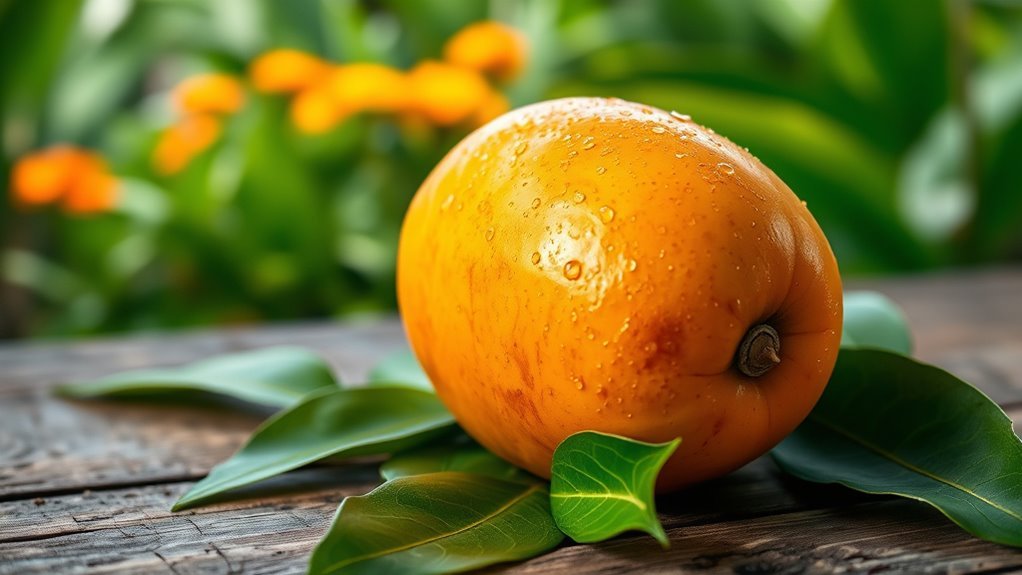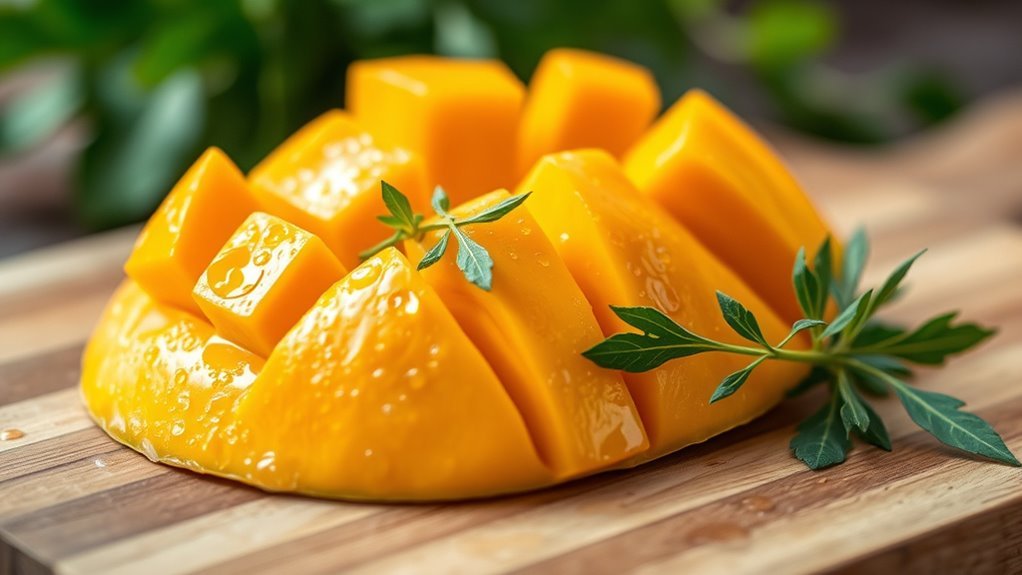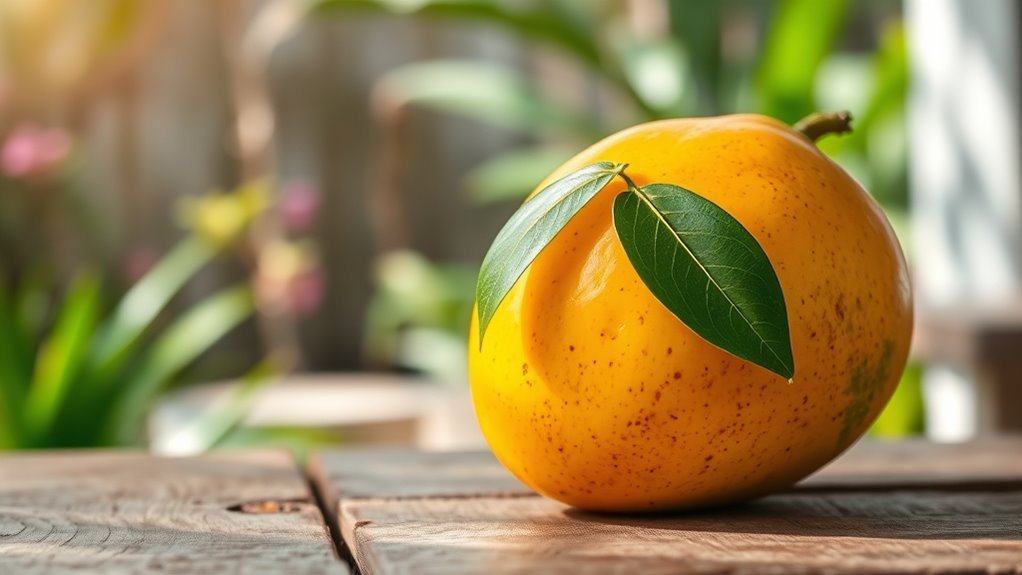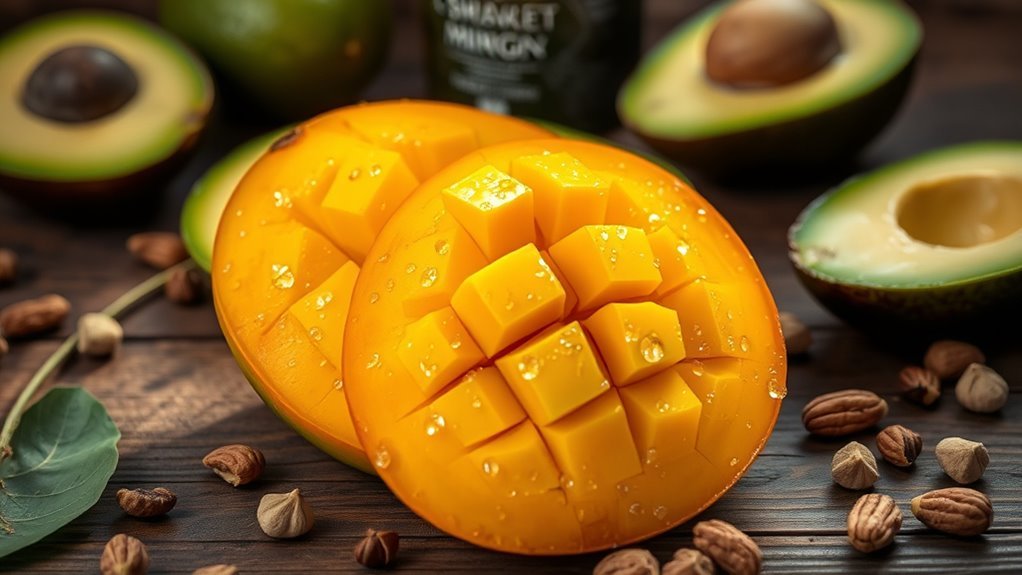Mangoes aren’t usually considered keto-friendly due to their high carbohydrate content. A medium mango contains about 45 grams of carbs, which can disrupt ketosis. While they’re rich in vitamins and fiber, it’s essential to monitor portion sizes if you choose to enjoy them on a keto diet. Low-carb fruits like berries are often better options. If you want tips on how to incorporate mango into your keto plan, there’s more to explore!
Understanding the Keto Diet

When you explore the keto diet, you’ll find it’s a low-carbohydrate, high-fat eating plan designed to shift your body into a state of ketosis, where it burns fat for fuel instead of carbohydrates. The core keto principles focus on drastically reducing carb intake while increasing dietary fats. This shift encourages your body to utilize stored fat, promoting weight loss and enhancing energy levels. Emphasizing healthy fats like avocados, nuts, and olive oil, the diet also encourages balance. While it offers freedom from constant hunger and energy dips, it’s essential to guarantee you’re getting adequate nutrients. Understanding these fundamentals can empower you to make informed choices that align with your health goals while enjoying a liberating lifestyle.
Nutritional Profile of Mangoes

Mangoes are a tropical delight packed with a variety of nutrients, but their carbohydrate content is something to contemplate, especially on a keto diet. These fruits offer numerous mango benefits, including vitamins A and C, which boost your immune system and skin health. With different mango varieties, you can enjoy unique flavors and textures, from the sweet Alphonso to the fibrous Haden.
Here’s a quick look at their nutritional profile:
| Nutrient | Amount per 100g | Benefits |
|---|---|---|
| Calories | 60 | Energy source |
| Vitamin C | 36 mg | Immune support |
| Fiber | 1.6 g | Digestive health |
Understanding these attributes can help you make informed choices while enjoying mangoes.
Carbohydrate Content of Mango

One medium-sized mango contains about 15 grams of carbohydrates, which can greatly impact your daily intake if you’re following a ketogenic diet. While mango varieties may differ in size and sweetness, they generally share this carbohydrate content. If you’re seeking keto snacks, you’ll need to be mindful of portion sizes when enjoying mango. Even a small serving can add up, pushing you closer to or beyond your carb limit for the day. If you’re craving the tropical flavor of mango, consider balancing it with low-carb foods to maintain ketosis. Ultimately, moderation is key—mango can be enjoyed, but it’s crucial to be aware of how it fits into your overall dietary goals.
Comparing Mango With Other Fruits
When comparing mangoes to other fruits, you’ll notice differences in carbohydrate content, which can impact your keto diet. For instance, fruits like berries tend to have lower sugar levels and fewer carbs, making them more keto-friendly options. Evaluating the nutritional value of each fruit can help you make informed choices that align with your dietary goals.
Carb Content Comparison
While many fruits offer a range of health benefits, their carbohydrate content can vary considerably, impacting their suitability for a keto diet. When making fruit comparisons, understanding carb types—like fiber and sugar—is key. Here’s a quick look at the carb content of mango versus other popular fruits:
| Fruit | Total Carbs (g) | Net Carbs (g) |
|---|---|---|
| Mango | 15 | 14 |
| Strawberries | 7 | 6 |
| Avocado | 12 | 2 |
As you can see, mango has higher net carbs compared to strawberries and avocados. While it’s delicious, it might not fit into your keto lifestyle as easily. Consider these numbers when planning your fruit intake!
Sugar Levels Explained
Understanding the sugar levels in fruits is just as important as knowing their carb content, especially for those on a keto diet. Mangoes, for instance, have a higher sugar content than many berries, which can lead to a significant increase in blood glucose levels. When you consume mangoes, your body may respond with an increased insulin response, potentially disrupting ketosis. In contrast, fruits like strawberries or raspberries contain lower sugars and are less likely to affect your blood glucose. It’s crucial to evaluate these differences when choosing fruits on a keto plan. Balancing your fruit intake with your overall carbohydrate goals can help you maintain your desired metabolic state while still enjoying the freedom of including some variety in your diet.
Nutritional Value Assessment
Although mangoes are delicious and packed with vitamins, their nutritional profile differs considerably from that of other fruits, particularly those favored in a keto diet. While mango benefits include high levels of vitamin C and A, they also come with a higher sugar content that may challenge keto compatibility. Here’s how mango stacks up against other fruits:
- Mango: Approximately 14g of sugar per 100g.
- Avocado: Less than 1g of sugar per 100g.
- Berries: Ranges from 4-10g of sugar per 100g.
- Watermelon: About 8g of sugar per 100g.
- Coconut: Roughly 6g of sugar per 100g.
If you’re following a strict keto plan, you might want to enjoy mango in moderation.
How Mango Affects Ketosis
When considering how mango affects ketosis, it’s crucial to look at its carbohydrate content, which is relatively high compared to other low-carb fruits. This can impact your blood sugar levels, potentially hindering your ability to maintain ketosis. Understanding these factors will help you make informed choices about including mango in your diet.
Carbohydrate Content Overview
Mangoes, while delicious and nutrient-rich, are high in carbohydrates, which can greatly impact your ability to maintain ketosis. If you’re considering incorporating mango varieties into your diet, it’s important to understand their carb content and how to make keto modifications.
- A medium mango contains about 45 grams of carbs.
- Some mango varieties are sweeter and have higher carb counts.
- The fiber content is beneficial, but it doesn’t negate the total carbs.
- You can enjoy small portions of mango while balancing other low-carb foods.
- Consider alternatives like avocado or berries for a keto-friendly fruit option.
Impact on Blood Sugar
The high carbohydrate content of mangoes can considerably impact your blood sugar levels, making it challenging to stay in ketosis. When you consume mangoes, their natural sugars can trigger a significant insulin response, causing your blood sugar to spike. This spike can lead to increased cravings and potential setbacks in your ketogenic journey. While mangoes are nutritious, their glycemic load is relatively high, which means that they might not be the best choice if you’re focused on maintaining stable blood sugar levels. If you’re committed to a keto lifestyle, it’s essential to monitor your intake of higher-carb fruits like mangoes to avoid disrupting your progress. Balancing your diet with lower-carb options can help you achieve the freedom you desire in your health journey.
Portion Control and Mango
Although many people love the sweet taste of mango, portion control becomes essential when you’re following a keto diet. Due to its natural sugars, it’s vital to be mindful of your portion sizes. Here are some tips to help you enjoy mango without derailing your keto goals:
- Stick to a serving of about 1/4 to 1/2 cup.
- Pair mango with healthy fats like avocado or nuts for balance.
- Use mango as an occasional treat rather than a staple.
- Consider blending small amounts into smoothies for flavor.
- Always track your carb intake to stay informed.
Alternatives to Mango on Keto
If you’re craving something sweet but want to stick to your keto plan, there are plenty of alternatives to evaluate. You don’t have to miss out on delicious flavors; there are keto-friendly fruits and low-carb snacks that can satisfy your sweet tooth without kicking you out of ketosis.
Here’s a quick look at some options:
| Keto-Friendly Fruits | Low Carb Snacks |
|---|---|
| Raspberries | Cheese Crisps |
| Strawberries | Almonds |
| Blackberries | Nut Butter |
These options not only provide sweetness but also deliver nutrients that fit your keto lifestyle. Embracing these alternatives lets you enjoy tasty treats while staying committed to your health goals.
Tips for Incorporating Mango Into a Keto Diet
While mangoes are higher in carbs compared to many other fruits, you can still enjoy them on a keto diet with some careful planning. Here are some tips to incorporate mango into your meals while staying within your carb limits:
Mangoes can fit into a keto diet with mindful portions and strategic pairings. Enjoy them while managing your carb intake!
- Use mango sparingly in smoothies or salads for added flavor.
- Pair mango with high-fat ingredients like coconut cream for a keto-friendly dessert.
- Opt for small portions in mango recipes to keep carbs in check.
- Create keto snacks by mixing diced mango with nuts or cheese.
- Consider using dried mango in moderation, ensuring it’s unsweetened.
Final Thoughts on Mango and Keto
Incorporating mango into a keto diet can be a delightful way to enjoy this tropical fruit without derailing your carb count. While mangoes are higher in carbs compared to other fruits, their health benefits, like vitamins A and C, fiber, and antioxidants, can be advantageous in moderation. Understanding keto misconceptions is essential; not all carbs are created equal. If you choose to indulge, consider controlling portion sizes and balancing your overall daily intake. You can still savor the sweetness of mango while adhering to your keto goals. Ultimately, it’s about finding that balance that works for you, allowing you the freedom to enjoy diverse flavors while staying on track with your health journey. Enjoy mango wisely!
Frequently Asked Questions about Mango and Keto
1. Is mango keto-friendly?
Mangoes are relatively high in carbohydrates compared to many other fruits, which makes them less ideal for a strict ketogenic diet. A typical serving of mango (about 100 grams) contains approximately 15 grams of carbohydrates, with around 14 grams of sugars. If you are following a strict keto diet, it’s essential to limit your carbohydrate intake to about 20-50 grams per day, so consuming mango might not fit within those limits.
2. How many carbs are in a serving of mango?
In a 100-gram serving of raw mango, there are approximately 15 grams of carbohydrates, including about 14 grams of sugar. If you’re monitoring your carb intake for a keto diet, you might want to choose lower-carb fruits or consume mango in very small portions and consider it as an occasional treat rather than a staple in your diet.
3. Can I eat mango on a low-carb diet?
Yes, you can eat mango on a low-carb diet, but moderation is key. Depending on your specific carbohydrate limit, you may want to consume only a very small portion. For example, a few slices of mango might be acceptable if you carefully track your carbs throughout the day. Always assess how it fits into your overall daily carb intake to ensure you remain within your desired range.
4. What are some keto-friendly alternatives to mango?
If you’re looking for keto-friendly alternatives to mango, consider berries such as strawberries, raspberries, and blackberries. These fruits are lower in carbohydrates and high in fiber, making them more suitable for a ketogenic diet. Avocado is another excellent option, as it is low in carbs and high in healthy fats, fitting perfectly into a keto lifestyle.
5. Are there any health benefits to eating mango?
Yes, mangoes are rich in vitamins, minerals, and antioxidants. They are an excellent source of Vitamin C, which supports the immune system, and Vitamin A, important for eye health. They also contain dietary fiber, which aids in digestion. However, due to their high sugar content, it’s important to balance the benefits with your overall dietary goals, especially on a keto diet.
References
- https://www.healthline.com/nutrition/keto-diet-foods#fruits
- https://www.dietdoctor.com/low-carb/keto/foods
- https://www.ncbi.nlm.nih.gov/pmc/articles/PMC5452229/
- https://www.livescience.com/what-is-keto-diet.html
- https://www.cdc.gov/healthyweight/assessing/bmi/adult_bmi/english_bmi_calculator/bmi_calculator.html
- https://www.hsph.harvard.edu/nutritionsource/keto-diet/


